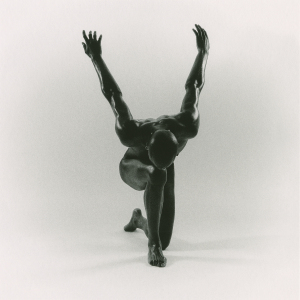
Petite Noir is the Congolese musician and artist Yannick Ilunga. Born in Belgium, raised in South Africa, Ilunga is the architect of Noirwave – a musical and cultural movement that draws creative energy from punk aesthetics and the fragmented identity of today’s African diaspora. He’s collaborated with Danny Brown, Saul Williams and Yasiin Bey, been championed by Solange. Ilunga now follows up his pioneering 2018 “visual album” La Maison Noir/The Black House with his second album proper, MotherFather.
“A conversation with God.” That’s how the musician and artist Yannick Ilunga – describes his long-awaited second album as Petite Noir, MotherFather. Making it, he says, has been a journey of self-discovery that he’s still coming to terms with. The album has a subtitle: ‘The darkness is comforting sometimes’. As Ilungna explains: “It’s about going through the darkness. But it’s also about rebirth. Because the dark times are needed for us to grow.”
While previous Petite Noir albums were recorded in situ in a studio, MotherFather came together on the move, as Ilunga flitted between Paris, London, Johannesburg, Cape Town and Los Angeles. The title came from a period of spiritual reflection that found Ilunga considering the nature of God. “Organised religion tries to make us believe God is this masculine figure,” he says. “But for me, that doesn’t make sense. God is a mother figure and a father figure.” This concept of duality extends throughout the record itself. From the opening “777” – a cry for redemption set to a series of incendiary drum barrages – to cracked urban symphony “Concrete Jungle” and the yearning Afro soul of “Finding Paradise”, this is a record that leaps between joy and pain, sweetness and abrasion, light and darkness in search of salvation.
Darkness has always been a source of inspiration to Petite Noir, ever since he broke out with his 2012 debut single “Till We Ghosts” – a sleek fusion of Afropop and new wave aesthetics that he called “Noirwave”. Ilunga’s unique sound and style proved an immediate sensation. He toured with Young Fathers, was championed by Solange Knowles, and released two works – 2015’s debut album A Vie Est Belle/Life Is Beautiful and 2018 “visual album” La Maison Noir/The Black House – that cemented his pioneer status. But over the last few years, the darkness has sometimes felt very real. There have been moments of personal turbulence. In 2019, his father Sylvestre Ilunga – a politician in the Congo since the 1970s – became the country’s prime minister, before being forced out of office in 2021. Ilunga also found himself reflecting on the racism he experienced growing up in Johannesburg, where the colour of his skin became a weapon to be used against him. “I had to break free from a lot of things that I've been taught that were normalized to me,” he muses.
As Ilunga crisscrossed the globe, he felt he was searching for something. He found it in David Sitek’s Glendale Hills Studio in the tranquil Los Angeles suburbs, where the pair completed MotherFather’s final track “Play” – a moment of ecstatic uplift that finds Ilunga crooning “I just need another way to process all these feelings”. From there, the serendipitous meetings kept coming, a brace of collaborators helping Ilunga bring his ideas to life. Across MotherFather‘s 11 tracks you’ll hear production from Moshik Kop, Tropics and the up-and-coming South African producer J1. “Blurry” is blessed by a rap by the Zambia-born Sampa The Great, while Grammy-nominated Florida jazz musician Theo Croker plays trumpet on the sunny “Simple Things”.
Through MotherFather’s gestation, there have been other creative alliances, too. Following his guest spot on Danny Brown’s 2016 album Atrocity Exhibition, Ilunga enlisted the Detroit rapper for his 2018 single “Beach”. And he’s recorded a brace of music with Yasiin Bey, the artist formerly known as Mos Def – watch this space. For now, though, we’ve got the most realised and accomplished Petite Noir album to date. By taking the time and space, Yannick Ilunga is shaking off his conditioning and figuring himself out as an artist and a human being. “It’s easy for me to say, yes, I’m pro-Black,” he wonders. “but am I actually doing the work? “In my mind, am I actually doing what it takes to be my own self as a human? MotherFather is about stripping all the ideas away, going back to the essence of what it is to be a human being. To do that, you have to go through the darkness.”

